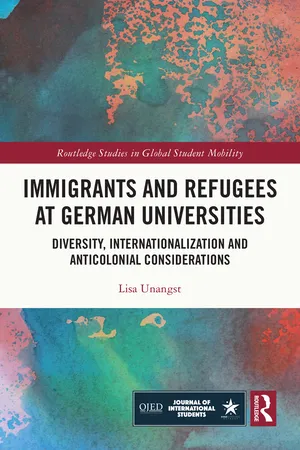
Immigrants and Refugees at German Universities
Diversity, Internationalization and Anticolonial Considerations
- 192 pages
- English
- ePUB (mobile friendly)
- Only available on web
Immigrants and Refugees at German Universities
Diversity, Internationalization and Anticolonial Considerations
About This Book
This book takes a critical and historical perspective in parsing the current state of play for refugee and immigrant students in Germany, addressing federal, state, and institutional innovations as well as gaps in service.
Drawing from de/post/anticolonial theory, it considers the levels of support for diverse groups including migrants, refugees, and racialized Germans, investigating why a comparatively well-resourced higher education system has, to date, selectively invested in the support of some marginalized groups. It calls for the reconsideration of policy and programmatic support, drawing from emerging best practice across states and higher education institutions (HEIs). Using historical analysis, federal and state level policy documents, institutional equal opportunity plans and student-facing websites, reporting, and first-person-accounts of marginalized students both prospective and enrolled, this critically oriented work interrogates how and why the world's fourth largest economy – and its primarily public higher education system – have failed to engage systemic change with an eye towards addressing mechanisms of exclusion including racialization and xenophobia. It concludes with a consideration of possible policy interventions supporting these minoritized student groups who are essential not only to German learning and economy, but also to the rebuilding of conflict states.
This volume will appeal to researchers, scholars, and practitioners working across comparative and international higher education, crisis education, and education in emergencies, as well as diversity specialists.
Frequently asked questions
Information
Table of contents
- Cover Page
- Half-Title Page
- Series Page
- Title Page
- Copyright Page
- Contents
- 1 Introduction
- 2 Higher education in the German sphere
- 3 German colonialism, postcolonialism, and coloniality
- 4 German immigration and refugee inflows
- 5 Germans of colour and representation in K–20 education
- 6 “Diversity” at German universities
- 7 Existing university programmes for migrants and refugees
- 8 Policy proposals
- 9 Implications for other higher education institutions and national systems
- 10 Conclusion
- Index